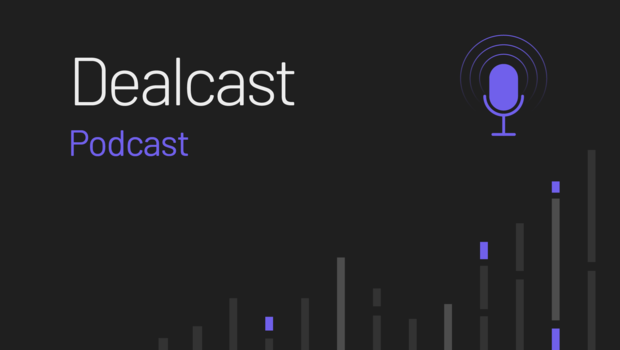Q1 2023 M&A Dealmaking Prediction
13 January 2023
In this week’s episode, host Julie-Anna Needham is joined by SS&C Intralinks Co-Head Bob Petrocchi, who provides an exclusive preview of predicted global and regional M&A activity from the Q1 2023 SS&C Intralinks Deal Flow Predictor.
Listen to learn about:
- Overview of 2022 dealmaking trends
- Global and regional M&A prediction for Q1 2023
- Why Asia Pacific is a market to watch
- Europe’s resilience in the wake of headwinds
- North America deal trends to look for
- Latin America’s hurdles and opportunities
Dealcast is presented by Mergermarket and SS&C Intralinks.
Dealmakers, download the SS&C Intralinks Deal Flow Predictor here.
Transcript
[MUSIC PLAYING] JULIE-ANNA NEEDHAM: Welcome to Dealcast, the weekly M&A podcast presented to you by Mergermarket and SS&C Intralinks. I'm Julie-Anna Needham, a business journalist who's been covering M&A for a decade. In this episode, we're looking at the M&A trends highlighted in the Q1 2023 SS&C Deal Flow Predictor. This is based on data from Intralinks' due diligence platform. I'm joined by Bob Petrocchi, co-head of SS&C Intralinks, to discuss the findings from the first quarter 2023 edition of the Deal Flow Predictor. Hi, Bob. Thanks very much for joining me today.
BOB PETROCCHI: Julie-Anna, it's great to be here. Thanks for having me back.
JULIE-ANNA NEEDHAM: Great. So let's start by looking at an overview of M&A activity globally. What trends did you see in 2022? And what can we expect to see in the first quarter of this year 2023?
BOB PETROCCHI: Wow, right down to the big questions. Right, everyone wants to know that. So I feel like the last time we were here, I had something similar. But the previous year was certainly unique. Not to belabor the point, but M&A definitely faced some headwinds in '22. I don't think that's a surprise to anyone. Yet, despite the jitters we're facing in the equity markets, M&A activity continues to move at a healthy pace.
In fact, Q3 of last year's finish was better than Q2, despite impairments in the early days due to summer seasonality and inflationary pressures. I bring up Q3 specifically because our DFP predicts announced M&A volume six months in advance in the market, and which we are here to talk about today. That's based on the insights since there are tens of thousands of deals that come across our global deal desk from M&A due diligence.
So based on our proprietary insights into Q3 '22 activity, we're forecasting Q1 '23 announced volume to be between 5 to 10 percent up against Q4 '22. So that's certainly a positive trend. And that's based on 12,081 deals announced by Refinitiv as well as Q1 '22, which saw 15,100 announced deals by Refinitiv. So a lot of numbers, but all in all, the activity remains buoyant from our vantage point. And although we don't make forecasts into the categories, another interesting insight from our Deal Flow Predictor in Q3 relates to bankruptcies and restructuring in IPOs.
So we saw material downward pressure on new IPOs starting globally. On a quarter-over-quarter basis, new IPO deals were down nearly 50 and over 80 percent on a quarter over quarter, year to date basis, which again, I don't think that's a big surprise to anyone, based on the state of the global equity markets. On the bankruptcy side, we did see double digit increases in new deals starting. So we're seeing a macro pressure, like inflation, really starting to add pressure on a lot of corporates.
JULIE-ANNA NEEDHAM: Thanks, Bob. So looking at the different regions now, starting with the Asia-Pacific region, can you talk us through what's been happening in APAC? And what have been the headwinds there, please?
BOB PETROCCHI: Sure. We track deal flows in all major markets. And we're very bullish on APEX deal flow, for sure, which actually showed the greatest increase in Q3 compared to other regions. Now, I also heard a data point in the news that savings across China is up significantly more than anywhere else globally. So that also gives us a feeling that deal flow and activity in that market will increase. So in the first quarter of '22, Refinitiv announced 4,153 deals. And we're forecasting APAC announced volume in Q1 to be plus 5 to 10 percent range compared to Q1 '22. So obviously, that's pretty significant.
On a quarter-over-quarter basis, we're forecasting greater than 10 percent growth against Q4 '22 announced volume, which was 4,014 deals, so again, positive trend. We're not going to bury the lead here. That's the largest forecasted increase in volume expected anywhere globally. When it comes to quarter-over-quarter growth, all the major markets in APAC, from Australia, India, Japan, South Korea, are sharing in that uptick. We saw a fairly seismic shift in China's zero-COVID policy last year.
While we're seeing infection rates dramatically increase temporarily due to new policies in the country, we believe China will come out a lot stronger in the long term. So all in all, despite the COVID challenges, we saw greater than 10% deal flow growth, both quarter over quarter and quarter over quarter, year to date in China. So they're continuing to show some muscle.
I would also say we're, from an Intralinks perspective, putting our money where our mouth is in China. We're spending a lot of time increasing performance in our platform. Expecting more deal volume, we're increasing our customer service presence here. We're increasing our technical capabilities. And we're increasing our global go-to-market coverage there because we do feel very bullish on that market.
JULIE-ANNA NEEDHAM: Thank you. And how does that differ to the EMEA region? What activity and trends are you seeing there? And does the Russia-Ukraine conflict pose further issues for this year ahead?
BOB PETROCCHI: Yeah. Well, we're nearing almost a full year since the beginning of the Russian invasion of Ukraine. And we suspect that the conflict is being priced into valuations and strategies already. So EMEA is definitely showing resilience in deal activity. It could be a sign that deal makers aren't really anticipating any escalation that would cause further disruptions to the market.
To look at some numbers, in the first quarter of '22, Refinitiv announced 5,909 deals. And we're forecasting EMEA announced volume in Q1 to be greater than 10% against that number. So that's pretty significant. On a quarter-over-quarter basis, we're forecasting in the range of negative five to plus five against Q4 '22 announced volume, which was 4,248 deals. So the region remains strong, with major markets in EMEA, like France, and Italy, and U.K., seeing strong performance compared to the same period last year, all growing over 10 percent.
When we look at our business, France and Italy were absolutely the two strongest. But we can't forget that EMEA is still standing on the front lines of an invasion in Ukraine. And it has a number of regional-specific headwinds to deal with, on top of global inflationary pressures. That said, having this level of deal flow in territories is a sign that valuations, and market levels, and buyers are still looking to invest in the region.
JULIE-ANNA NEEDHAM: And turning our attention to the West now, North America has led deal volume levels during the past year. So what trends can we expect towards the end of this year or later on in this year?
BOB PETROCCHI: I think I reviewed Ken's transcripts from his podcast last time, just to compare to myself, to make sure that I was up to par. But I know he mentioned in the last DFP episode that the U.S. is outsized the impact globally in providing market confidence and direction. So to that point, as a global volume leader in M&A deals, the moon and deal appetite coming out of the US will definitely reverberate globally. And we saw some strong downward pressures in North America, led by the US, in the first half of Q3, but rebounding in the back half, which is putting the region on a stronger footing.
Again, if we look at the specific numbers in the region in the first quarter of '22, Refinitiv announced 4,623 deals. And we're forecasting North America announced deals in Q1 to fall more than 5% compared against Q1 '22. So on a quarter-over-quarter basis, we're forecasting in the range of negative five to plus five against Q4 announced volumes, which was 3,504 deals. And I think the listeners will remember that we're comparing this against an exceptionally strong market in '21. So it's not all doom and gloom from our vantage point. You're trying to grow over record-breaking volumes in North America.
So to put it in perspective, Q3 '22 pre-announced M&A deal flow in North America was the third strongest quarter, going back to 2019, and continues the upward trend that we've seen through the first three quarters of '22. So in short, we think the markets globally are still healthy.
JULIE-ANNA NEEDHAM: Thank you. And looking towards Latin America now, continuing our bounce around the globe, the region has seen major political events during the last year, including presidential elections in Brazil and Colombia, and certainly some unrest in Brazil recently. Can you talk through the trends in Latin America and what hurdles during the past year have had a major impact on that region, please?
BOB PETROCCHI: You're right. I think we've all grown accustomed to political unrest in that region. It's always in flux. And if it's not Brazil, it's Venezuela or somewhere else. So there's a lot of overhang in Latin America right now, including the presidential election, as you mentioned. And that's a challenge. And Argentina is also in a significant debt crisis. LATAM benefited and rode the global wave last year with the COVID bump. And we saw some uptick in the back half of Q2 through the first half of Q3. But some of the '22 volume in the region really tempered in the first quarter of '22.
To look at the actual results, Refinitiv announced 423 deals. And in Q4, 315 deals were announced. We have a negative forecast, both quarter over quarter and quarter over quarter yearly, with greater than a 5% decline against the aforementioned in Q1 '23. So for some additional context, Q3 early stage volume was the fifth strongest quarter going back to 2019. So it falls almost in the midpoint of a wider range. There's plenty of room for growth. So dealmakers are in discounted territory. But the forecast remains negative.
JULIE-ANNA NEEDHAM: And rounding all of that up, what are the possible challenges we can expect in this new year? And is there a reason to be optimistic?
BOB PETROCCHI: Well, I'll tell you I'm always looking for a reason to be optimistic. But the same concerns Ken brought up in the last quarter, I echo today. Interest rates, borrowing costs remain the biggest global overhang. Rates are already at their highest since 2008, with more hikes being priced into growth strategy across the globe. Although in the US, Chairman Powell has certainly indicated that maybe the rate increases will slow. But that remains to be seen. Fortunately, rate hikes aren't coupled with a credit crunch. So financing is still available for the strategics who need to finance a deal. And it's costing more. And that has an impact on the deals.
Obviously, the Ukraine invasion is a global concern. And any escalation beyond its current situation could severely impact not only the markets, but global security. So we're all hoping for a very quick resolution there. There's a host of challenges, many of them man-made, that hopefully can be solved this year. But based on our proprietary forecasts, as I mentioned in the intro, we're expecting global growth in M&A volume to start off the year. So it seems like despite these global challenges, there's still a driving appetite for M&A rather than a fear of it.
If I think of what we're doing as a business, we're continuing to invest heavily in new products, innovation, service expansions, territory expansion. So we're rolling out products. We're rolling out geo expansions in the markets that are the most active. And we're going to continue to grow our networks of partners and cross-sell with SS&C across all the businesses. We feel, going into the planning process for '23, very bullish on the outcome. And we're forecasting growth in all our businesses. So I think there's some positive news there, if we squint.
JULIE-ANNA NEEDHAM: Great. Thanks very much, Bob. That was Bob Petrocchi, co-head of SS&C Intralinks. Thanks for listening to this week's episode of Dealcast, presented by Mergermarket and SS&C Intralinks. Please rate, review, and follow the podcast. You can find us on Apple Podcasts, Spotify, or look out for your Mergermarket news alert. For more information, have a look at our show notes. Join us next week for another episode.
[MUSIC PLAYING]


